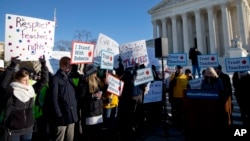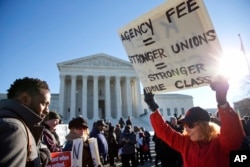Conservative U.S. Supreme Court justices on Monday voiced support for a legal challenge that could erode organized labor's clout by depriving public-employee unions of millions of dollars in fees that state laws force non-union members to pay.
Chief Justice John Roberts and Justice Anthony Kennedy, two key votes on the nine-member court, indicated during an 80-minute oral argument in the case involving California teachers that they could side with the three other conservative justices in delivering a ruling overturning a 1977 high court precedent.
The case was spearheaded by a conservative group called the Center for Individual Rights which helped a group of California public school teachers bring their case claiming mandatory fees violate the First Amendment rights of workers who disagree with the union's positions.
The lead plaintiff in the case is Rebecca Friedrichs, a public school teacher in Orange County, California, who says she left the California Teachers Association after becoming disillusioned with its mission.
She wants the high court to overturn a 1977 ruling that said states can require non-members to pay "fair share" fees. These fees cover what it costs the union to represent them in bargaining as long as the money does not go for political purposes.
Unions fear the potential loss of tens of millions of dollars in fees could reduce their power to bargain for higher wages and benefits for teachers, firefighters, sanitation workers and other government employees.
While half the states already have right-to-work laws banning mandatory fees, most members of public-employee unions are concentrated in more liberal-leaning states that don't, including California, New York and Illinois.
Both Roberts and Kennedy appeared unsympathetic to the California Teachers Association's argument that non-members would become "free-riders" if not required to pay the fees to fund collective bargaining activities because they would benefit from collective bargaining without having to pay for it.
"The union basically is making these teachers 'compelled riders' for issues on which they strongly disagree," Kennedy said.






